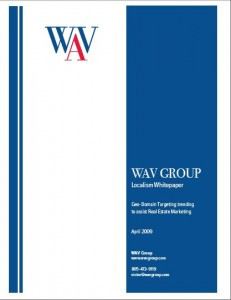 For more than two years, WAV Group has been doing research that provides insight for real estate companies to focus on strategies that will accelerate their online business opportunities.
For more than two years, WAV Group has been doing research that provides insight for real estate companies to focus on strategies that will accelerate their online business opportunities.
We have studied consumer and broker opinions of MLS Consumer Facing websites, Broker websites, the effectiveness of listing syndication, broker lead response and even mobile search. All of these studies were focused on measuring components of online strategies deployed today around the real estate industry.
In this new report, titled Localism – WAV Group endaveours to look outward into the future of online effectiveness. We look forward to getting feedback from you on this study. Feel free to comment here or contact any member of the WAV Group for deeper information.
Special thanks go out to the industry experts whose interviews and contributions were most valuable in supporting this thought leadership including Monte Cahn, CEO Moniker.com, Scott Freisen, COO McCombs Media, Craig Harrison, CEO of RealEstateNet and our friend Kenneth Jenny, Managing Partner of Mediatise.
DOWNLOAD HERE –
What follows is an executive summaryExecutive Summary
Localism – a fundamental building block of a successful web strategy that includes
deploying a network of local websites based on natural type-in keywords location,
location, location.
This whitepaper seeks to provide an in depth review of localization related to search
within website URLs as the foundation of a successful forward-looking website naming
strategy that will generate increased online business to real estate websites.
A major shift has occurred recently in the way that consumers interact with the Internet
and with each other a popular term for this is “Localism”. Consumers are interested in
knowing everything going on around them; news, events, friends, resources. As a
result, consumers naturally type in city modifiers as anchor text to their search.
There are a number of elemental economic strategies that are dovetailing to support
how information is organized around location and delivered to consumer audiences.
These strategies focus on URL naming structures and tagging of information to allow for
and produce location based results.
Localism is a departure from the traditional brand-driven online strategy of
“brandname.com”. Over time, some brand names die, but the consumer type-in of city
and category on the Internet will not. Specifically, as it relates to real estate
www.BostonReal Estate.com will long outlive www.BrandName.com. Another example
would be the difference between owning Investing.com vs. Lehman Brothers.com.
LehmanBrothers.com has deeply declined in value today now that the brand has gone
away.
Localism allows site owners to create an asset that is far stronger than their brand asset
alone. This is a key understanding for real estate websites where half of every search
containing the keyword real estate also contains a geographic modifier like a city name.
Owning a destination on the Internet like SanFranciscoRealEstate.com is much stronger
than owning PacificUnion.com. Domain names centered on consumer type-in behavior
drive direct navigation to the most valued destination sites.
To compete for local audience, companies are using local terms as anchor text rather
than brand names to build a stronger online asset. With the evolution of the Internet,
consumers are now searching for information and filtering that information by location.
Understanding how to tune your site to appear on the first page of geographically
anchored search results is critical because localism defines the local service promise of
the company. If you rank well for localism, your conversion rates will be twice as high.
According to an Opinion Research study, fewer than 25% of consumers look beyond the
first page of search results.
According to Kenneth Jenny, Managing Partner, Mediatise, LLC and former CEO of
RealEstate.com: “as real estate becomes more of a global business, search is localizing
the industry. Unlike the old days of brand and domain recognition (built by advertising),
today real estate search is all about the listing. Consumers are seeking localized search
for very specific listing information as for brand, company and listing broker or agent,
they just simply come along with the listing. Lets face it, the number one search site for
real estate is Google.”
Search Engines Key on Localism
Early efforts in localism were seen in search engines like Google, Yahoo Local, Ask City
and others. Google Maps, formerly Google Local, looks for physical addresses
mentioned in regular web pages. It provides these results to searchers, along with
business listings and maps. Product-specific search engines, such as Google Product
Search use techniques such as targeted web crawling to direct feeds to collect
information about products for sale in a specific geographic area. Forward thinking
online companies have taken advantage of Localism by embedding city names into their
webpage keyword and metatag strategy by combining a city name + product category,
e.g. Tampa real estate.
Emerging Strategy Focuses on Localism incorporated into URL
The emerging strategy is to extend localization by seeding the location tag directly into
the site URL, e.g. santamariarealestate.net. This localization strategy is producing
outstanding natural search engine rankings for companies targeting the real estate
consumer. Localism represents a significant departure from brand name URL strategies.
As this image illustrates, a search for “Santa Maria real estate” yields a first page top
search result displaying santamariarealestate.net a valued position for a local Santa
Maria real estate broker, Prudential.
Although this local URL strategy seems pretty straight forward, other factors need to be
considered as well. It is critical that the site also contain deep information about the
keyword that satisfies the consumers keyword inquiry, in this case, Santa Maria real
estate. Our research found that there are many city name + real estate URLs which do
not show at the top of search results because there is little information about local real
estate on the pages of the web pages they represent. The city name modifier, while
extremely important, is not enough by itself. For top search engine ranking product
content is also a requirement. Santamariarealestate.com did not appear anywhere on
the first five pages of google results because it is a link site rather than a consumer real
estate website. Content relevant to the local search results is paramount to high ranking
search results and requires that the local URL strategy is combined with strong relevant
content to develop strong returns.
SantaMariaRealEstate.com is failing because search engines track the consumer clickthrough
activity and demote sites that consumers click away from immediately, learning
that the search result failed to meet the consumer keyword information request.




